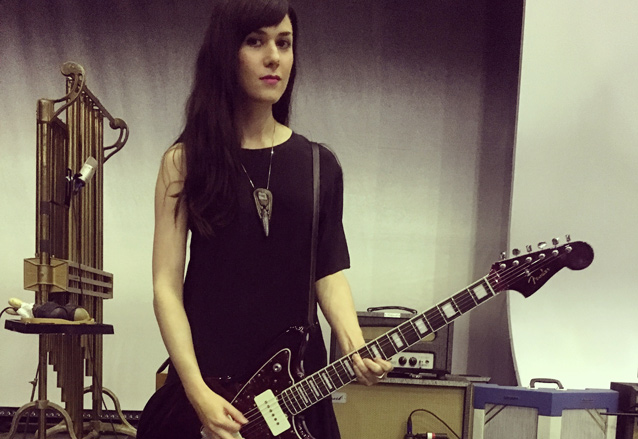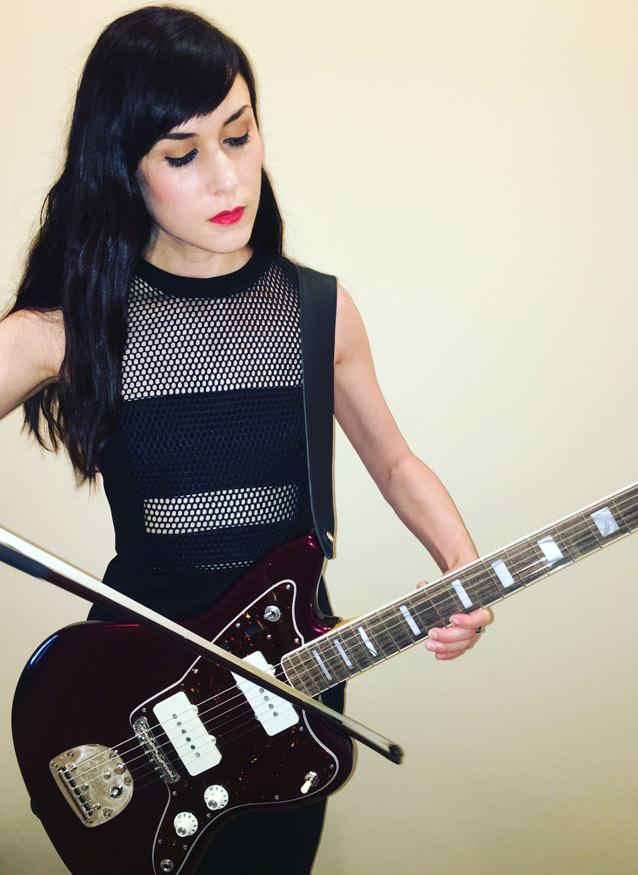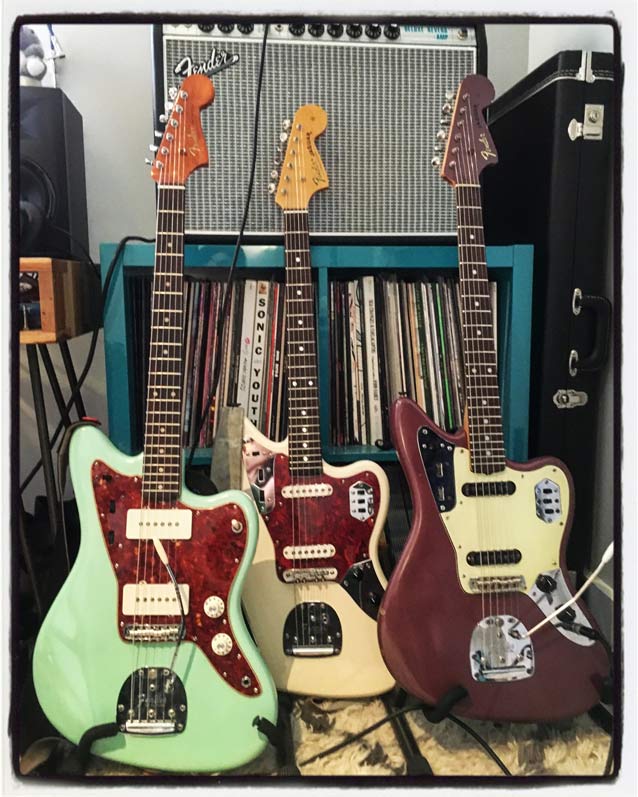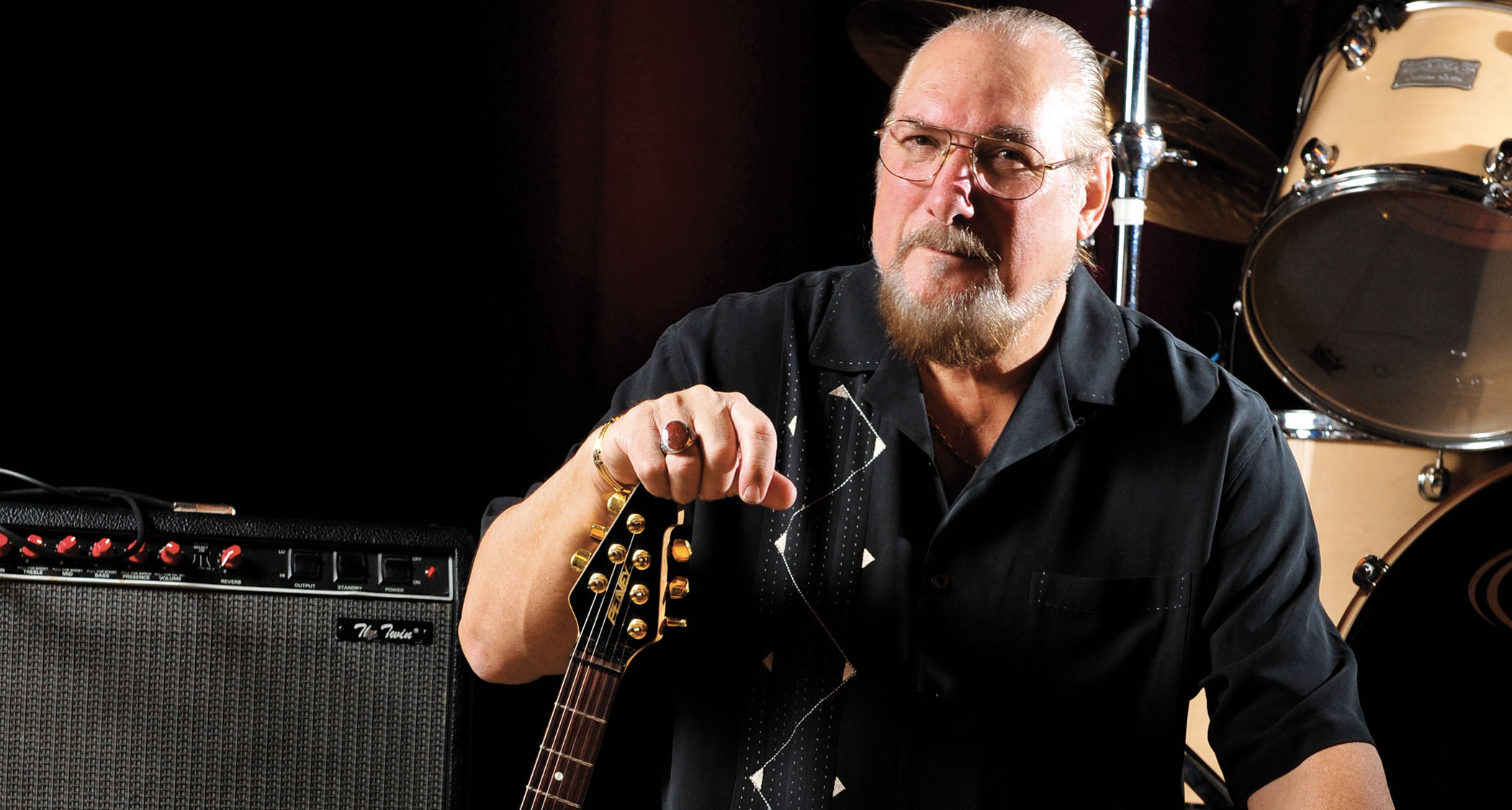Noveller Talks Cinematic Music and Her Healthy Obsession with Pedals
All the latest guitar news, interviews, lessons, reviews, deals and more, direct to your inbox!
You are now subscribed
Your newsletter sign-up was successful

Los Angeles (by-way-of Louisiana, Austin and Brooklyn) based guitarist Sarah Lipstate, who performs under the name Noveller, came to our attention earlier this year when Iggy Pop asked her to be his opening act on his Post Pop Depression tour.
In huge gilded theaters across the U.S. and Europe, she performed on stage solo, armed with just a Jazzmaster or two and a pretty significant pedalboard.
The cinematic, majestic, ethereal instrumental soundscapes she creates are haunting, beautiful, and impossible to ignore. During a quick stop in New York that fell between a show in Oslo, Norway, and a cross-country drive to LA, Noveller sat down to talk about her personal journey with the guitar and her obsession with pedals.
When did you start playing guitar?
I started when I was 17. I got a horrible summer job. It could have been cool cause it was an independent music store, but I was working in this shack behind the music store where all the cool stuff was, and I cleaned the used rental brass instruments. My job was to wear these rubber gloves and sit in this old rusted out bathtub and scrub these dirty instruments. It was so gross.
By the end of the summer I had maybe $275, which allowed me to buy the cheapest guitar in the store, this Danelectro that they discounted even further because it was this purplish blue which I guess was not appealing to that many people. I got that and a Danelectro Dirty 30 amp. I still have it. Since I had to really earn that guitar, it was a good way for me to start my relationship with this instrument because it didn’t come easy.
Did you take lessons?
I took one lesson from this cool rocker chick who worked in the store, and she showed me how to play major chords. What really inspired me to play guitar at the time was Sonic Youth, the Pixies and Talking Heads, and one of the first things I tried to figure out was how to make feedback. I learned the basic chords, but that was as far as I went in studying how to play, because I had a background with piano and trombone. I was so tired of people telling me, "This is the right way and this is the wrong way.”
I wanted to do my own thing. So I just started putting my guitar in alternate tunings. I would mess with the strings until something sounded dissonant in a way that was prettier. To this day with Noveller, open D is my main tuning. With an open tuning, it’s easier to find your way around intuitively. I still never play in standard tuning.
All the latest guitar news, interviews, lessons, reviews, deals and more, direct to your inbox!
How do you describe your style?
I think cinematic is a good term. I say it sounds like the music you hear scoring a film. I get people throwing out "ambient" and "atmospheric," and there are definitely elements of that, but there’s also a lot of melody and structure, and the music evolves. It’s not just like I drone for 30 minutes. Cinematic is vague enough but also conjures up enough of the essence of what I do.
Was your style always kind of the same or were you playing different types of music when you first started?
When I first started, none of my friends cared about the same music. I didn’t have any other people to play with. So the Christmas after I bought my guitar my parents got me a four-track cassette recorder. My first guitar recordings are pretty similar to Noveller music now, cause it was layered guitar experiments. I didn’t have any pedals at that point so it was different, but it was weird, and then when I went to college at the University of Texas at Austin, I played with other people which led me down a path of writing more structured songs.
I was playing with a drummer, Carlos, and was using alternate tunings but coming up with structured songs, and what led me back down the melodic, ambient path, was that we were playing in a garage and kept getting the cops called on us for noise complaints, so finally we decided Carlos would play synth and I’d play the guitar. I had a delay pedal and we just started messing around with different sounds. We started recording these improvised jams in my bedroom direct into the computer, and that really worked for us, so that started the trajectory that led to Noveller.

At what point did you adopt the name Noveller instead of using your name?
Carlos and I decided we wanted to put out these ambient recordings. We came up with a group name, One Umbrella, and he was adamant that we use aliases, so mine was Novella, like a short story, cause I thought it was a beautiful word. What led me to even thinking about doing solo stuff was there was a call out on the internet for submissions of experimental leaning recordings for a compilation called Women Take Back the Noise. It was a female-only experimental noise compilation, so I did my first solo recording.
The woman who was putting out the compilation loved it and asked for my project name. I remember thinking, I have One Umbrella and I’m Novella, but I can just modify it a bit, and came up with Noveller, and sent that off. That was maybe 2005, and I had no idea that I would be living with this moniker 11 years later.
What are the best and worst things about not having bandmates?
I was in the band Parts & Labor for about a year and a half. I got to learn what it was like to be in a touring band and record an album. We were playing all these shows and we were getting paid but the money went to the van and the practice space—it never went in our pockets. I got fired from my day job because I kept asking for time off to go on tour. It just did not seem sustainable. It was a great learning experience but it was hard. The greatest thing about being a solo performer is it’s much easier to make it a sustainable career. I get to make my own schedule. Also with Parts & Labor, the band formed around 2001 or 2002.
I was not contributing creatively unless it was just embellishing or adding ideas to the structure that already existed, so it was like I was performing "guitar playing woman" in the rock band. And that can be interesting but it wasn’t fulfilling to me like Noveller is. With Noveller, I can make enough money and I don’t have to rent a van or a practice space. Overhead’s low, I can record at home and I can make my own schedule. I am not a strong woman, physically—carrying my own gear sucks. Having a bunch of other people to carry stuff, that’s the biggest thing that I miss [laughs].

Does it get lonely touring by yourself?
It can. It has in the past. Probably the greatest experience was this past tour [with Iggy Pop]. He had the best band in the world, the Queens of the Stone Age guys, and Matt Helder from Arctic Monkeys and Matt Sweeney on bass and a huge crew who were all amazing. I could isolate myself as much as I wanted, but if I wanted to hang out, they were all there and luckily we all really got along and they embraced me. It was the perfect balance. That is a beautiful thing and it had a huge impact on me in a positive way.
When did you start getting into effects so heavily?
In Parts & Labor I was playing music that had already been recorded, so they told me to get some Boss pedals or some Electro-Harmonix pedals. I started discovering more boutique and specialized pedals when Noveller was my main focus. What really did it was, around 2011, I played a show in New York and my pedalboard was stolen. In a way it was a good thing, because I posted about it on the internet, and immediately, fans and also sympathetic musicians that I hadn’t even met before were like, “Hey I have this stuff laying around but I’m not using it, I’m happy to give it you.”
I ended up putting together an entirely new board on donated pedals. Then I started going to Main Drag Music [in Brooklyn] and looking for new pedals and they’d suggest things to check out. So it was kind of out of necessity, and then as I’ve been more prolific with sharing on social media, I’ve had boutique companies come to me and offer to send me a demo pedal, see what I do with it. It’s my obsession. I get a new pedal and I’m just inspired to spend time with it. It also feels really good to support boutique companies, companies like Fuzzrocious where it’s a family business. If they’re putting their love into their product, chances are it’s going to be a good product. I like exchanging that energy, and I feel like it has a positive effect on me and my work.
What’s the one pedal that’s crucial to your sound that you couldn’t live without?
I recently got the Electro-Harmonix Superego pedal. I use a violin bow, I use e-bow sometimes, I do a lot with sustained tones, and the fact that you can do that with this Superego synth engine is really exciting. That’s been the most influential to my current sound. I’ve been getting into these weird pedals like the Count to Five by Montreal Assembly. This particular pedal is a delay with pitch shifting capabilities and sampling capabilities. It’s really complicated. This is a pedal you really have to get to know. EarthQuaker’s been making some amazing stuff—the Avalanche Run is great. The Red Panda Particle is so insane and I love that pedal. For this European tour I pared it down to 14 pedals, and for me this is minimal.
What would a Noveller signature pedal do?
I’m actually talking with people now about it. I’m pursuing this reverb pedal idea with an awesome pedal company—we’re just talking about it though. I just played this show in Buffalo and there are these concrete grain silos there. A guy who lives on site and works there told me that there’s 40 seconds of natural resonance in the silo. It blew my mind. I’ve played in a church before that has a lot of reverb, but I’ve never been in a space like this. This is why I use guitar pedals, to get this sound. I was really inspired by that, and was thinking about how to capture the feel and the sound of this organic space into a pedal.
I’m not stupid enough to think I could come up with some completely original pedal concept with no engineering training, but I was just really moved by that. So in terms of a pedal, it would be about how I can imbue this experience or this feeling into a pedal. It’s not gonna be the greatest or the only reverb out there that does this thing but it would have this special thing that people connected with.
What’s your current rig?
When I was out in LA in July, [luthier] Paul Rhoney sent me a custom-made Oceana Duotone. It’s a great guitar. It’s a semi-hollowbody, and as a performer who’s not particularly strong and who plays a lot of guitar, I love how this guitar feels. I think he wants it back though, so he said he’s going to custom make me a Paramour. I’m sure it’s going to be a magical guitar. I’ve never had that experience with a luthier before. I feel like a kid in a candy store. Once you start working with a luthier, you realize how special that process is, having a dialogue while the guitar’s being built, versus going to the store and buying a beautiful vintage instrument which is great and it’s imbued with its own majesty, but it doesn’t really have anything to do with you, you know?
I also just picked up from my apartment here [in Brooklyn] my ’61 Jazzmaster. I also play an Olympic white Jaguar that’s a Japanese reissue. Since the tour I’ve accumulated additional guitars—a ’65 Jaguar, burgundy mist and the Troy Van Leeuwen signature Jazzmaster. And I have a Fender Bassman Tweed amp and a Fender Deluxe Reverb reissue.
Working with a luthier makes you think differently about what you like because you have to figure out exactly why you like the guitars you like.
Yes! I never thought about the different woods before. Paul Rhoney would ask, “What do you think about this zebra wood?” or “What do you think about this swamp ash?” I was like, I’m willing to learn! I could see myself retiring and wanting to learn those skills. It’s just amazing. I have so much appreciation for that.
For more about Noveller, visit sarahlipstate.com.
